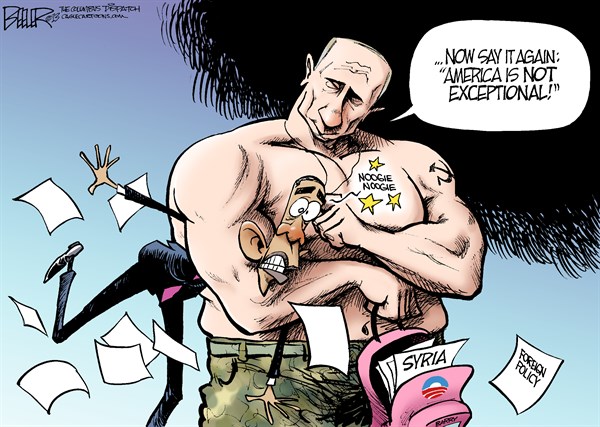“US Foreign Policy Is ‘A Combination Of Naive Denial & Incoherent Mumbling'” — ZeroHedge.com
Excerpted from Paul Singer’s Elliott Management letter to investors
AMERICA RETREATS FROM THE FIELD
Another element of high risk stemming from developed-world policies in this second decade of the 21st century is national security. All of these countries have run down their military capabilities and their ability to influence political and military developments and address dangers in the world. They are behaving as if actual threats to their own (or global) security simply will not exist in the world of the future, or as if oratory, not backed by actions or (worse yet) actually belied by actions, will be sufficient to ward off adversaries. The U.S. Administration in particular has passionately thrown off the mantle of leadership and replaced it with a combination of naïve denial and incoherent mumbling. In effect, without any evidence to support this notion, developed countries have interpreted the history of the world since the unprecedented barbarism of the early and mid-20th century to mean that “there ain’t gonna be no (big) war no more,” to paraphrase the wide-eyed folk song. That lovely thought flies in the face of literally thousands of years of human history. A more practical thought is that force moves in to fill vacuums, and the developed world, particularly America, has been purposefully and clearly creating vacuums.
Among the various adverse effects of the changing geopolitical landscape is the inevitability of surprising realignments and alliances that will refashion global affairs, and probably not in the direction that the developed world expects or favors. For example, if Russia and/or China gain traction in the Middle East as America pulls away, the consequences could be serious for Israel and energy supplies to the West, which, could easily in turn lead to other realignments. America’s retreat from reliable global leadership could be followed by it being pushed in unpredictable ways. We have a difficult time conceiving of positive endings to this story. However, the negative consequences that are likely to spill out and take form should not come as any surprise, because the results of recent foreign policy blunders are already visible on several fronts. Sadly, policymakers who are making the decisions seem to be living in a kind of head-in-the-sand dream world, unattached to practical and historically-informed reality.
Of course, we do not believe that military force is the solution to every contentious global situation. However, if the world perceives a superpower as strong, reliable and willing to take action to back its promises, that perception can and does preserve stability, and the opposite can encourage mischief and danger. The world is currently experiencing a surfeit of the latter. There is no way to tell how deep and consequential the danger, or the surprising ways and places in which this interconnected problem will be resolved. The range of potential outcomes, however, is negative to very bad.
Let’s unpack this a little more by taking a closer look at the Middle East. When the Ottoman Empire was dissolved in the early 20th century, the Western powers basically ignored or made false assumptions about the tribes, alliances, religious subtleties and cultures of the affected territories. Boundaries were drawn with the stroke of a pen, with little-to-no regard for the possibility of adverse consequences. While there were Christians and Jews living throughout the region at the time, all of the resulting countries and mandates were Muslim-dominated. Later in the 20th century, Israel was created as a Jewish homeland, and Jews in the rest of the region were forced from almost every Muslim nation. Christians remained as (and are to this day) a minority in several of the countries.
Many of the 22 resulting Arab nations were ruled by a variety of autocracies, from kingdoms to theocracies to family-run countries to secular dictatorships to mere thugocracies. Because the region is home to 40% of the world’s hydrocarbon reserves, the rest of the world essentially has been beholden to a handful of Middle Eastern countries, a status that has changed little in the ensuing decades through today.
In the meantime, however, the natural strains of artificial boundaries and mixing of peoples have become too strong, and particularly after the “Arab Spring,” a number of the countries have experienced revolutions of various kinds. While the consequences of the 2003 invasion of Iraq by the U.S. are still playing out, it is worth noting that Islamic radicalism was on the march and jihad was an expanding force well before 9/11. The events of that fateful day demonstrated that the West could no longer ignore the growing passions of Islamic radicalism.
So the fracturing of Iraq appears to be a piece of a chaotic reformation of the Middle East. Given the importance of oil and gas in the global energy and economic growth equation, if America is withdrawing from the region, other countries (particularly Russia and China) are likely to step in to fill the vacuum.
Prior to 1973, the global oil giants effectively ran the market for hydrocarbons. Since then, OPEC has been in charge, led by several Arab countries. Now the future leadership and control of this vital market is up for grabs. America could be the global leader in oil and gas if only it were to fully maximize its substantial domestic reserves and capabilities. Islamist groups appear to be achieving a significant and growing measure of control over the Middle East’s resources. The impact of the fracturing of countries in the region and the evolving control of hydrocarbons will be among the most important influences on global financial markets and economic growth in the next few years.
